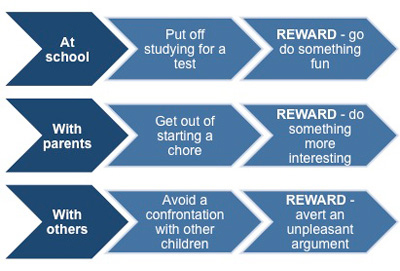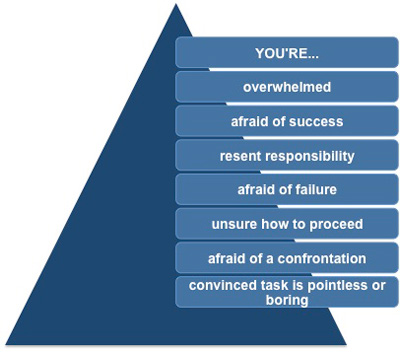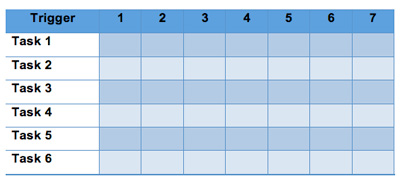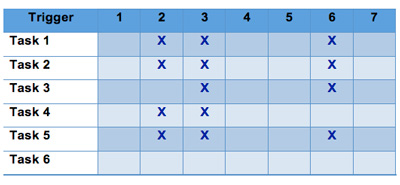Stop Procrastinating - Why People Procrastinate
The reason that people procrastinate is quite simple. It provides an instant reward in the shape of a relief from immediate stress. In other words, by not starting a task that you know will prove stressful, you feel a sense of relief that, though temporary, is nonetheless very real and satisfying.
 |
Procrastination acts as a reward because it takes one away from something unpleasant or threatening.
It is a behavior that often begins quite early in life; and because you are 'rewarded' by behaving in this way it becomes a habit, which follows you from childhood, through your teenage years, and into your working life.
In all of these cases, your reward was immediate and made you feel good, so you continue to behave in the same way when confronted with an unpleasant or threatening situation. Here are just a few examples you may have adopted yourself.
 |
In many cases the reward will be temporary and you will still have to confront the thing you are trying to avoid, but not always.
Occasionally you will find that the test was canceled, parents did the chore themselves or you were excused for some other reason. In the case of the confrontation, it never happened because the next time you saw the person they had forgotten about it, or it just didn't seem that important any more.
The fact is that avoiding dealing with something you don't want to do straightaway can be a rewarding strategy, something that is not often acknowledged. This is one of the reasons why it can become such an ingrained behavior.
The immediate 'sense of relief' reward is the main reason why people procrastinate. However, knowing this is not actually much help unless you are able to get to the root of why there is a 'sense of relief' associated with not starting a particular type of task.
You should think of this reward as a symptom rather than an underlying cause. This reward will always be present, it will always be more immediately gratifying not to do a particular piece of work because you will always be able to find something more enjoyable to do in the short term. The trick is to look beyond this, to identify the types of task that you are tempted to avoid and to devise strategies for overcoming the procrastination reflex.
Understanding the Triggers for Procrastination
There are seven common triggers that lead people to put off certain tasks and these are listed below. Some tasks may encompass more than one of these triggers, which can make it difficult to isolate the reason for procrastination.
 |
Understanding the triggers for procrastination should help you to pin down why you are avoiding certain types of task, which is the first step to regaining control over this destructive behavior. Even if none of the following seem to fit your exact situation, they may help you to confront and clarify your own feelings about the tasks that you are avoiding. Our Overcoming Procrastination eBook is designed to help you understand the problem better and learn some successful ways of dealing with it.
The next part of this eBook considers each of these triggers in turn. Rather than simply reading through the list, you should think of situations where putting off a task has caused, or is causing you, a problem. Write down the name of these tasks in a grid as shown.
There is no reason to show the completed grid to anyone else, so be honest with yourself about your reasons even if they don't show you in your best light. It is important that the grid is an accurate reflection of how you feel about each task otherwise you will be wasting your time with this exercise.
 |
You can then think about each of the tasks in turn in relation to the possible triggers shown as numbers in the top row of the table. For each trigger there are suggested questions to ask yourself to ascertain if the particular trigger is why you are putting off performing the task.
If you recognize that a particular trigger is a factor in preventing you from starting the task, then mark it in the grid. If you really want to understand why you procrastinate then you need to take this exercise seriously, which means taking the time to think about each task carefully.
1) The Task Appears Boring or Pointless
Do you feel that the task is not using your potential?
Do you feel that the task is beneath your skill level?
Do you feel that the output from the task will not be acted on?
Do you feel that the task is being done for no good reason?
Do you feel that you've done this task over and over again and have lost interest in it?
2) The Task Involves a Possible Confrontation
Does the task involve a potential confrontation with:
• a co-worker?
• a customer?
• a supplier?
3) You Resent Being Given Responsibility for the Task
Do you feel that the task should be the responsibility of someone else?
Is the task commensurate with your job title and job description?
Do you feel that you are not being properly rewarded for the responsibility that goes with the task?
4) The Task Appears Overwhelming
Do you feel that you don't have:
• sufficient time to complete the task?
• sufficient training to complete it?
• enough experience to complete it?
5) You Don't Know How to Proceed
Do you feel that you could start if you had a clearly defined first stage?
Do you feel unclear about the expected outcome?
Are you unsure of exactly what is required to perform the task?
6) You are Afraid of Failure
Do you feel that you will be judged by:
• your boss on the outcome of this particular task?
• your peers on the outcome of this particular task?
Do you feel that there is a significant chance you will fail to achieve what is expected?
Do you feel that factors beyond your control are likely to cause you to fail?
7) You are Afraid of Success
If you complete the task successfully, do you feel that:
• you will be 'rewarded' with something even more difficult?
• you will be moved to another team or department?
• you will be promoted?
• you will alienate your friends?
• successful completion will have a negative impact on other people?
After working through the tasks in the table and considering each in turn, you should have a grid that looks something like the one below. Each task will have one or more crosses against it that represent your view of that task.
 |
Most people find that the crosses predominate in one or two areas and these are the ones that you need to attend to if you are going to overcome your problem with procrastination.
In this example, three of the five tasks are being put off because:
• the person fears confrontation,
• they resent being given responsibility for the task, and
• they fear failing at it.
There may be some cause and effect at work here. For example, it is quite possible that the fear of confrontation is leading to both the feeling of resentment and the fear of failure. In which case the fear of confrontation is the cause and the feelings of resentment and fear of failure are symptoms of the fact that this person is very uncomfortable with confrontation.
This example begs the question: Would the person feel resentment or fear of failure in the absence of their main concern, which is fear of confrontation? It is possible to imagine circumstances where they would not.
For example:
1. If they were confident in their ability to handle confrontation well, then they probably would not object to being asked to do the task and they would perhaps feel as though they could complete it successfully.
2. On the other hand, the feeling of resentment might be perfectly justified, if the task does not fall within their job description or accepted duties.
3. Similarly, the fear of failure might be justified if there is a lot at stake and they are being held solely responsible for the outcome.
The point of completing your own version of the grid is that it will enable you to see if there are any patterns in your own behavior. The reasons for procrastination are often complex and interdependent and it is only by imposing some structure on them that you will be able to get to the root cause.
The next step is to consider each of these areas in turn. If you have managed to identify an area that is of particular concern to you then you should work on this area in isolation. As detailed earlier, procrastination is usually an ingrained behavior that is very difficult to overcome.
You will have far more chance of success if you concentrate on one area at a time and you may find that most of your procrastination problems have one root cause.
You may also be interested in:
Stop Procrastinating | Symptoms of Procrastination | Dealing with Boring or Pointless Tasks | Dealing With Tasks Involving Confrontation | Tasks You Resent Being Given | Tasks That Appear Overwhelming | Tasks You Don't Know How to Begin | Tasks You Are Afraid of Completing | Lack of Motivation.



